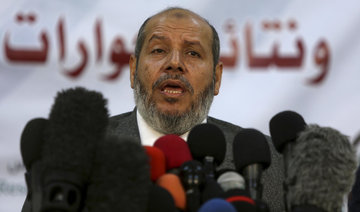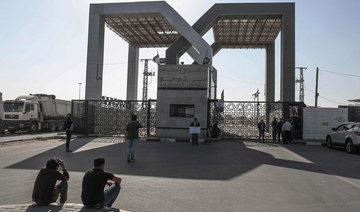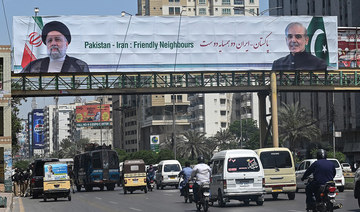JERUSALEM: As Friday’s deadline nears for Gaza’s Hamas rulers to cede power to the rival Fatah-dominated Palestinian Authority, hopes for a new dawn in the enclave face hurdles at home and abroad.
Islamist movement Hamas has run the Gaza Strip for a decade and does not recognize Israel, with whom it has fought three wars since 2008. Hamas is labelled a terrorist group by the United States and the European Union.
President Mahmud Abbas’s Palestinian Authority governs the Israeli-occupied West Bank from Ramallah and Hamas maintains a separate, parallel administration in Gaza City.
Separating the two cities is a band of Israeli territory about 70 kilometers (44 miles) wide. Gaza is cut off from Israel by a separation barrier with fortress-like crossing points.
Israeli Prime Minister Benjamin Netanyahu’s position is that Israel will not deal with a Palestinian unity government that includes Hamas unless it recognizes the Jewish state, renounces violence and returns the remains of two Israeli soldiers killed in Gaza, among other conditions.
“Some say that you cannot have a peace process without Gaza and you cannot have Gaza without Hamas, which means that there is not going to be a peace process,” Yaakov Nagel, Netanyahu’s national security adviser until May this year, told journalists last week.
“No one is going to have a peace process with Hamas.”
The official line from Washington is based on principles set out by the Quartet for Middle East peace — the United States, Russia, the European Union and the United Nations.
“Any Palestinian government must unambiguously and explicitly commit to nonviolence, recognize the state of Israel, accept previous agreements and obligations between the parties — including to disarm terrorists — and commit to peaceful negotiations,” President Donald Trump’s envoy Jason Greenblatt said last month.
There are potential ways around the seeming impasse. One would be for a unity government to include ministers who are not part of the Hamas movement but have its approval.
After Palestinians elected Hamas in a democratic 2006 poll, much of the international community immediately said it could not deal with Hamas unless it accepted the Quartet’s principles.
Former British prime minister Tony Blair, later a Quartet representative, has since said that was a mistake, as it pushed Hamas away from the negotiating table.
Hugh Lovatt, an analyst for the European Council on Foreign Relations, says that has left an impact, “at least in some European capitals and at EU level.”
“There is a feeling that the EU should not repeat the mistake of 2006 when it boycotted and sanctioned a Hamas government,” he told AFP.
“The EU could likely accept a Palestinian government of national consensus that accepts the Quartet conditions, even if Hamas as a movement does not,” he said.
Addressing the Security Council on November 20, UN envoy Nickolay Mladenov said the Egyptian-mentored Palestinian reconciliation process “must not be allowed to fail.”
“If it does, it will most likely result in another devastating conflict,” Mladenov warned.
But Israel’s Nagel does not believe that any meaningful change will happen in Gaza.
“I don’t see a real reconciliation process, but we will see,” he said.
“None of the real issues between Hamas and the (PA) were on the table in the negotiations. It was only logistics and unimportant things, because Hamas understood that it has to do something.”
One major issue left to be resolved is the issue of security in the Gaza Strip.
Abbas says there can be only be one security force in all of the Palestinian territories.
But Hamas restated this week its refusal to disarm its military wing, the Ezzedine Al-Qassam Brigades.
























